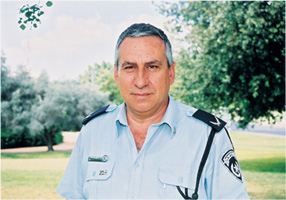Dr. Elazar Tzadok, Director of the Identification and Forensic Science Division of the Israel Police, first donned his police uniform at the age of 49, with the rank of brigadier general. This occured in October 1999, one year before the outbreak of the recent wave of violence. "Normally, our role is to support a variety of investigations, from apartment break-ins and stolen cars to murder, rape, or armed robbery," says Tzadok. "Due to the current security situation, the division also performs important national functions, such as identifying explosives used by terrorists, helping the security forces to find out where explosives are being prepared, and assisting in the identification of victims of terrorist acts.
If a car bomb has been used, our task is to check where the car came from, whether its plates were forged or stolen, and so on. In the event of a shooting, we have a ballistics lab that analyzes the empty shells found on the scene to determine the kinds of weapons used and establish a connection between different acts."To provide a scientific basis for identifying crime suspects, the division employs cutting-edge technology as well as traditional methods. The division is also responsible for polygraph testing, analyzing handwriting in the case of forged passports and ID cards, and identifying and characterizing counterfeit money.
All seized illicit drugs pass through the division's analytical lab.Tzadok received a B.Sc. and M.Sc. in Chemistry from Tel Aviv University and did his army service in the technological unit of the IDF's Intelligence Corps. That was where he met his future Ph.D. adviser, Prof. Yehuda Mazur, who served as consultant to the unit. Tzadok followed Mazur to the Weizmann Institute of Science."I started my doctorate at the Institute in 1979 and spent four years in the Organic Chemistry Department.
Those were among the best years of my life. I felt that I was in the right place doing the right thing. The high scientific level, the international atmosphere, and the serene environment allowed me to delve into my favorite subjects." After completing his Ph.D., Tzadok received an offer from the technological unit of the IDF's Intelligence Corps to create a new analytical chemistry division. He later held other senior positions in the Intelligence Corps, twice went abroad for postdoctoral studies, and worked in the private sector before joining the Israel Police.
Tzadok is married to Nechama, who earned an M.Sc. from the Weizmann Institute's Science Teaching Department. They have three sons: Avi, who is completing a second degree in physics; Adir, who is studying for a degree in Communications and Political Science; and Nir, who is in high school.
